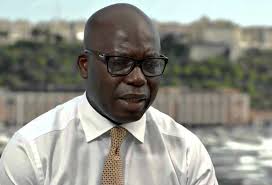...To get all news updates, Join our WhatsApp Group (Click Here)
Also Join our WhatsApp Channel (Click Here)
The axiom that; ‘experience is the best teacher’; describes Oil mogul and shrewd businessman, Adewale Jubril Tinubu, with the sobriquet JAT. The GCEO of Oando Plc, had always proved his vast experience in business with uncommon brilliance and wizardry. So, when he promised OANDO shareholders at the beginning of 2018 that; he would move the leading Oil and Gas company to an enviable height, many did not doubt his competence. He had always delivered far above expectation. Today, he has not only fulfilled his promise, but he had also lifted Oando far above its competitors.
The continued increase in oil prices and sales volumes, Nigeria’s exemption from the production cut by the Organization of Petroleum Exporting Countries (OPEC), capital discipline and reduced disruptions on production activities in the Niger Delta are contributing factors to the improved cash flows and impressive results posted by Oil and Gas companies operating in Nigeria in the third quarter of 2018.
Underlining how far both majors and indigenous companies have come since oil prices plummeted in 2014, Oando PLC recently posted its nine months ended September 2018 results, with a profit of N10.4 billion, a 46% increase, compared with N7.1 billion in the same period of 2017 and a 70% reduction in debt. In 2014, the company took out debt to the tune of $900 million towards the $1.6 billion landmark acquisition of ConocoPhillips Nigeria assets; today the company has achieved a commendable 70% reduction in this debt to approximately $270 million. These numbers further reinforce the success of Oando’s ongoing initiatives to create value for stakeholders, and drive sustainable growth as well as its potential to access new funding for new projects.
The company had since recovered from the effects of the oil price crash, with this being its second year of consecutive profits and its 3rd profit in 2018. Seplat’s profit-after-tax (PAT) stood at $91 million compared with $5 million in 2017; Total’s adjusted net income increased by 48% to $4 billion compared to same period in 2017 and was 11% higher than in Q1 2014 when oil prices were over US$100/bbl; while Eni made a net profit of 1.53 million euors in the third quarter of 2018.
Oando’s 46% jump in year-on-year quarterly net profits beat market expectations. Despite being in the middle of an indirect shareholder dispute which has led to a yet-to-be concluded SEC forensic audit, the company recorded a 32% increase in its turnover to N505.1 billion from N383.5 billion in comparative period of 2017, driven by higher commodity prices; while its gross profit grew by 9% to N77.6 billion from N71.2 billion in 2017.
Speaking on the company’s financials, Adewale Tinubu said; “Today’s positive result is further evidence of the progress made by Oando in 2018 driven by our continued focus on execution and operational efficiency, supported by buoyant commodity prices.”
Thanks to good operational efficiency, these results confirm Oando’s ability to take full advantage of the improved macro environment to deliver on key corporate imperatives of increased revenues and profit to create value for her shareholders. As the year draws closer to an end, the management of Oando must be applauded for their dedication to keeping the company on course by delivering yet another consecutive quarter of strong financial performance.
In the exploration and production sector, Oando’s upstream subsidiary, Oando Energy Resources made a stellar performance as it benefited from the ramp-up of higher margin production resulting in a 45% increase in realized crude selling price compared with the same period in 2017. According to the company’s press statement, performance was further buoyed by sale price increases of 6% for Natural Gas Liquids and 31% for natural gas deliveries. In the downstream, Oando traded over 10 million barrels of crude oil and ensured petroleum products efficiency through the importation of 445,483MT of refined products.
Commenting further, Oando’s Group Chief Executive said that; “The outlook for the remainder of the year is positive and we remain committed to delivering on our value-based strategy towards improving our liquidity by reducing our gearing, improving our profitability by increasing production, and achieving growth via strategic alliances.”
Oando’s continued positive results and corporate initiatives reinforce the company’s focus on redefining the role of independent players as vital in supporting the socio-economic growth of the nation. In 2018, the company has been particularly active in showcasing to its stakeholders the output from its day to day operations as well as the positive impact it is having in the communities it operates in.
In the third quarter of this year the company in partnership with its Joint Venture partners commissioned a 20,000 gallon water scheme for the over 5,000 residents of Agbere Community, Bayelsa State, in the process reducing the number of Nigerians without access to clean portable water. In the same vein in the Aggah community in Rivers State the company commissioned asphalt road and drainage projects, alongside their JV partners, NNPC & NAOC. Other community projects commissioned include roads and drainage in Irri Community, Isoko South Local Government Area of Delta State and in the Oguta Community, Imo State.
More recently in line with the company’s commitment to Nigerian Content Development, they ran in collaboration with their JV partners, NAOC and NNPC a series of content development workshops in Yenagoa, Bayelsa State. These workshops, carried out in partnership with the Nigerian Content Development Monitoring Board (NCDMB), focused on compliance best practices, procurement regulations and business financing strategies to help improve the quality of output from local contractors as well as the promotion and development of in-country capacities for the industrialization of Nigeria.
Speaking on the future outlook for the company, Wale Tinubu explained that the company would build on this performance in the coming quarter as well as step up organic and inorganic development activities across its existing portfolio.
You can get every of our news as soon as they drop on WhatsApp ...To get all news updates, Join our WhatsApp Group (Click Here)
Also Join our WhatsApp Channel (Click Here)
















